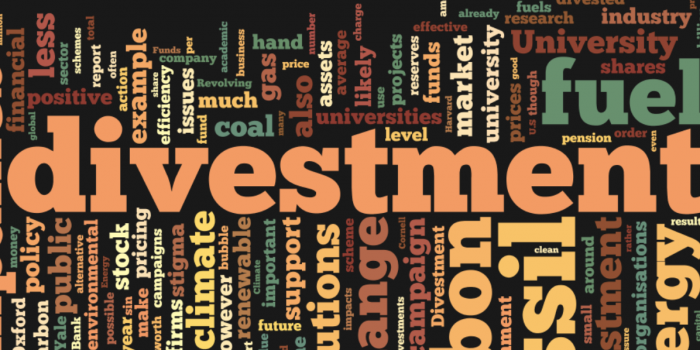This report evaluates the effects of the fossil fuel divestment movement and identifies practices with which the divestment movement can have the largest impact in connecting with the wider climate change movement to tackle climate change.
Based on the finding that the divestment movement is unlikely to impact the share prices of fossil fuel companies but can generate stigma that makes policy change more possible, this report also proposes the following the recommendations for divestment campaign groups at various levels:
- Incorporate the demand that organisations should reinvest the money currently in fossil fuel companies into (i) renewable energy or (ii) energy efficiency projects.
- Sharpen the messages of the divestment movement by (i) highlighting the contrast between public support and government policy regarding fossil fuel industry and renewable energy, and suggesting that politicians have only been accountable to the fossil fuel industry instead of the electorate; (ii) including a positive frame into the movement through the added focus on “Re-investment”, contrasting green growth against “dirty oil” and pointing out that we can move from dependence on fossil fuel to a greener future by “divesting” from fossil fuels and “re-investing” into renewable energy and energy efficiency projects.
- Engage actively with the academic staff at their institutions, especially those engaged in relevant research, and when circumstances permit, encourage academic staff to take part in negotiation with the universities; and work with research programmes on stranded assets in influencing conventional institutions to get their support and push for relevant regulations.
- Consider innovative carbon pricing schemes as either (i) the next step of the campaigns for those already successful at pressuring for full divestment ; or (ii) an alternative approach for institutions that have been consistently reluctant in divesting.
Through incorporating the element of “Re-investment” and calls for carbon pricing schemes, the divestment movement can have a wide range of meaningful effects in supporting renewable energy, decreasing the climate impact of existing organisations and making more possible nation-wide policies on carbon pricing. Sharpening the messages of the movement can increase the salience of environmental issues by emphasising the series of contrast between public support and government policy, and between the positive frame of “Re-investing” and the negative frame of divesting from the fossil fuel industry. Influencing conventional institutions through engaging with the academia can also help bring about pivotal changes in regulation and climate risks perception.
Acknowledgements
This report was written by a team of Oxford University students: Zoe Carmichael, Jingtian Chen, Ellen Clarke, Daniel Harris, Joe Kidson, Elissa Li, Luca Nazzicone, Timo Maas, Ridwan Sanad, Richa Sinha, and Youpeng Tang. The interviews were conducted by Zoe Carmichael, Jingtian Chen, Ellen Clarke, Daniel Harris, Joe Kidson, Luca Nazzicone, Ridwan Sanad, and Richa Sinha. Operational support was provided by committee members Cristian Leata, Natascha Eichinger, Rachael Midlen and Iftikhar Latif. The report was edited by Jingtian Chen and Natascha Eichinger. We would also like to thank Helene Winch for her comments and our interviewees for their help during the project.
In addition, we thank the Oxford Hub for their continued support of OxPolicy.





